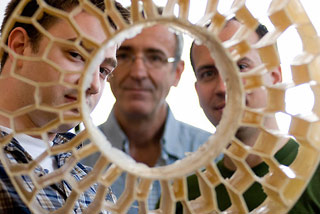UW-Madison engineers help Resilient Technologies reinvent the wheel
In military combat, vehicle tires are critical, as blown tires can mean troops are stranded in dangerous situations. Wausau, Wis.-based Resilient Technologies is working on a non-pneumatic tire with a honeycomb-like design, which can’t be shot out and could save lives.

In this 2008 file photo UW–Madison mechanical engineering graduate students Eric Foltz (left) and Nick Newman (right), along with faculty adviser Tim Osswald (center), look through the honeycomb pattern of an early prototype of a non-pneumatic tire they helped create.
Photo: Jeff Miller
UW-Madison engineers are partnering with Resilient to develop the tire and help the company grow in Wisconsin.
The collaboration is another example of UW–Madison’s strong ties to Wisconsin’s economy. Last week, an economic study found that the university’s impact on the state economy totals $12.4 billion a year, helps support 128,146 Wisconsin jobs and generates $614 million in state tax revenue.
Resilient delved into advanced mobility technologies soon after founding in 2005, and a grant from the U.S. Department of Defense connected the company with a team from Engineering Professional Development (EPD), including faculty associates and program directors Frank Rath and Carl Vieth.
EPD in turn guided Resilient to the Polymer Engineering Center and mechanical engineering professor Tim Osswald, who worked with Resilient engineers for two years to refine and test the tire design.
Osswald remains in contact with Resilient as a consultant, but EPD also supports Resilient beyond the lab.
“Resilient views us more as a business partner,” Vieth says. “They’re using us as portal to resources on campus and beyond. “
The EPD team guides Resilient toward non-campus partners, such as machinists and automation companies, many of which are in Wisconsin. “This spins out and expands into the broader state economy,” Vieth says.
Rath and Vieth also advise Resilient on how to move toward military and non-military commercialization. “Frank is vital in directing us toward solutions in many different areas, ” says Ed Hall, Resilient chief operating officer.
As Resilient continues to grow as a company, Hall anticipates the company’s relationship with UW–Madison also will evolve.
“There are lots of subjects where you can’t just jump on Google and find out who is the best,” Hall says. “The EPD knowledge and resources make it a lot easier to find experts in the field.”
For Rath, it’s rewarding to see a Wisconsin technology startup thrive. “We worked with Resilient before they even had employees. Now they have around 20, and these are high-skill, high-tech jobs-the kind of jobs we really want to see in Wisconsin,” he says.
Hall wasn’t surprised UW–Madison offers so many connections and resources for businesses. “They’re doing lots of things that have benefits beyond basic academic benefits,” he says.
“They didn’t look at us as a science project, but as a growing business. They were interested because what we are doing could save lives.”
Enjoy this story?
Read more news from the College of EngineeringSubscribe to Wisconsin Ideas
Want more stories of the Wisconsin Idea in action? Sign-up for our monthly e-newsletter highlighting how Badgers are taking their education and research beyond the boundaries of the classroom to improve lives.
